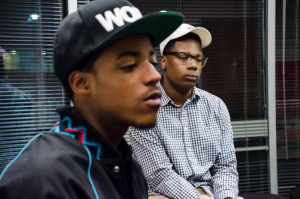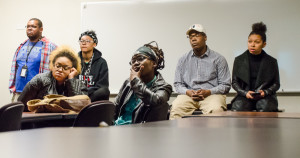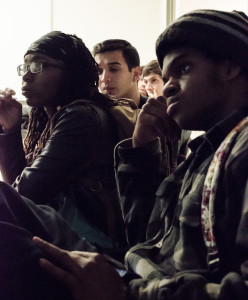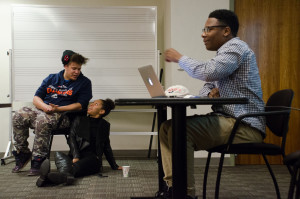Tags
Related Posts
Share This
Light in Darkness: Charles Simon

Key speakers discuss notes before the event begins. Photo by Rebeca Gonzalez
On Feb. 25, a dozen or so students gathered in Benildus for a seminar on dismantling white supremacy titled “Light in Darkness.” Coordinated by Black Student Union Founder and Campus Relations Officer Charles Simon, the seminar began at 7:30 p.m. and continued until 10:30 p.m.. The seminar discussed how integrated into our culture white supremacy is and what students can do to uproot it. Jackalope sat down with Simon to discuss the seminar as well as his own philosophy of how to bring about change.
—
Jackalope Magazine: What made you want to put on this seminar?
Charles Simon: It started with my upbringing. I was coming into my adult years…and I went through this reiteration of my culture and who I was and who I was trying to be…Initially it started with knowing that I wanted to come to college…I started the Black Student Union on campus because I saw that there was a good amount of us on campus and we weren’t represented. I just wanted us to be represented on campus…

Members of Black Student Union gather to learn about white supremacy and what they can do about it.
Photo by Rebeca Gonzalez
So after I started BSU, I went home and I was given a book by one of my mom’s friend named Phavia Kujichagulia. We would always talk about conscious stuff even when I was younger. Before I left [to go back to school] she said, ‘I’m going to send you a book so give me your address because I just wrote one…’ So she sends me this book and the book’s name is Recognizing and Resolving the Roots of Racism. Initially, I was like, ‘Woah! This is some heavy stuff. This is exactly what I would like to read,’ because it was right after Trayvon Martin passed away and there was just a lot of stuff happening in Congress and in our country. These were the first notions that racism and white supremacy were still real and very prominent in our culture. As a young man, I didn’t know how to handle it or how to think about it. I think I could have had the wrong mindset on how to change it, so reading the book definitely gave me the tools to understand that there’s a organized way to do it… That’s how I came up with the idea to do the event because after I was done reading the book, immediately what I wanted to do was get this knowledge out. I wanted to change things, but I understood that I couldn’t do it alone. We’ve seen people like Martin Luther King Jr., we’ve seen people like Ghandi, we’ve seen people like Malcom X, and somebody asked during the presentation ‘Do we need a leader?’ and I was like, ‘Well, yeah, we do need a leader, so to speak, but that leader is within all of us.’
JM: The seminar didn’t take place in just one room in Benildus. Attendees moved from one room to the next. What made you want to structure it that way?
CS: That came from was what it was like for me reading the book. When I was reading the book, I didn’t read it full through. I had to read it in little spurts and pieces because it was so much information… It would kind of psyche me out and I would be in this different realm. I wouldn’t be able to function in society because I was tripping off how fake [society] is and how much isn’t being told to me. It was a lot of information for me to hold onto and really grasp. So I thought, ‘I can’t sit there in a room and talk about this whole thing in one space. It would help if it was a tour that you could walk through and take your time.’ I think it worked very well. When we were done talking about a subject or were getting really deep on a subject…It was good to know we could walk out, reconvene in the hallways, talk about it a little bit, get refreshments and come back with a fresh mind, ready to attack a new subject.

Tulani Mason, Chassity Coleman, Robert Canales and Daniel Omar listen to the cause and effect of racism.
Photo by Rebeca Gonzalez
JM: You said that this was something that people could come into at any section and still get something out of it. What was that like?
CS: If you were somebody who didn’t come in at the first part of it, you didn’t miss anything. You could hop in at any part.…There were two guys who saw what was going on and thought ‘Alright. I’ll stick around,’ and it was good for that reason. And that’s why it was 7:30 p.m. to 10:30 p.m. because I knew people had work and schedules where they [couldn’t come on time] even though they said ‘I’d really like to make it.’ I don’t like to tell people you can’t go. I’ve never forbidden somebody or given anyone a barrier because I’ve seen those barriers and it sucks because there shouldn’t be barriers [when it comes to learning].
JM: If there was one thing you wanted people to walk away from this seminar with, what would that be?
CS: Mainly I wanted to hit the point that all people with melanin dominance, or ‘melanites,’we’re all in this game. It’s not just conducive to one race or gender. We’re all in this together. Nobody is safe [from white supremacy]. We have to assure our safety to be the best that we can be. I want people to know that and feel that with everything that they’re doing… You can hinder it by saying ‘this is only a black thing’ or ‘this is only a black and white thing’ but it’s not between just us. It’s all of the races… It’s everyone’s problem. We have to notice that and acknowledge that. That’s something that we don’t acknowledge. It’s part of that apathy that we carry with the white supremacist mindset…People who think it’s not happening to them specifically or in their daily lives, [think] it’s not their problem, so it’s solved, but it’s really not. We have to stop doing that because that’s letting somebody die. You’re letting somebody be denied their job. You’re letting somebody be denied their right to be an actual human being. We have to stop that… We’re putting ourselves out there and we’re saying ‘Hey! Recognize me as a human being!’ and the person on the other side…is saying ‘No! You’re not! You’re a black man and because you’re a black man, or because you have melanine dominance in your skin tone, you can’t do this, you’re not allowed to do that.’ There’s all these things they’re trying to deny us. You can’t work with someone who’s denying your rights or try to be their friend, because that’s not a friendly situation. We have to recognize that and stop being friendly to it because the more we’re friendly to it and the more we’re apathetic to it [the more we’re] part of that [white supremacist] game. I can’t allow myself to do that.
I don’t want to have a child and have them ask me why they were called a slanderous word or why they went out for a job that they were qualified for and they didn’t get it. I shouldn’t have to explain to them that that’s how people are or that’s how the world is…The world can be so much better…I would like to change it so that my child can grow, so that a kid has their greatest potential from day one.

James Perry explains the roots of white supremacy. Photo by Rebeca Gonzalez
JM: Who inspires you?
CS: The first people to do this inspire me. Right now my main inspiration happens to be Ghandi. I just watched a whole documentary on his life and the way he made the changes that he did…When you start to speak the truth, good things around you start to pop out of the ground like flowers. I like the way how he explains all of it because it’s a process that you have to be trusting in. You’re going to meet a lot of destruction, a lot of the darkness that you’re trying to push away, but you have to stay conscious. You have to keep that light bright because other people are looking at it but they’re looking at it from very far away. You’re trying to get them to come closer to you so that they can turn on their lights and everyone can shine.
JM: How can people who didn’t make it to the event still get this information and make a difference?
CS: Come talk to me!…It’s always good to have that people to people conversation to understand each other and really move forward. I would say definitely reach out to the Black Student Union, [BSU Staff Advisor] Ryan Henson and myself. As long as we keep talking about these things, we’re going to keep putting out these waves of consciousness…As long as we keep talking about it and spreading the knowledge for it, there’s no place to go but up. When we go up we’re going to meet barriers and we’re going to meet walls, but it’s all about knowing where your trajectory is going… We’re not going anywhere but up and if we’re going down, we need to figure out how to get back up. We can’t allow ourselves to go down anymore. It’s an ode to self that I will not allow us to go back down anymore. I will die if we do not change things. We will all die if we don’t change things.
—
The Black Student Union meets every Thursday at 9pm. You can find out more by joining the #BSU of SFUAD Facebook group. For more information on “Light in Darkness” or how to attend next semester’s event, please contact Charles Simon at charles13simon@gmail.com.






 Jackalope Magazine is the student magazine of Santa Fe University of Art and Design. Building on the interdisciplinary nature of our education, we aim to showcase the talent of our university and character of our city.
Jackalope Magazine is the student magazine of Santa Fe University of Art and Design. Building on the interdisciplinary nature of our education, we aim to showcase the talent of our university and character of our city.
Recent Comments